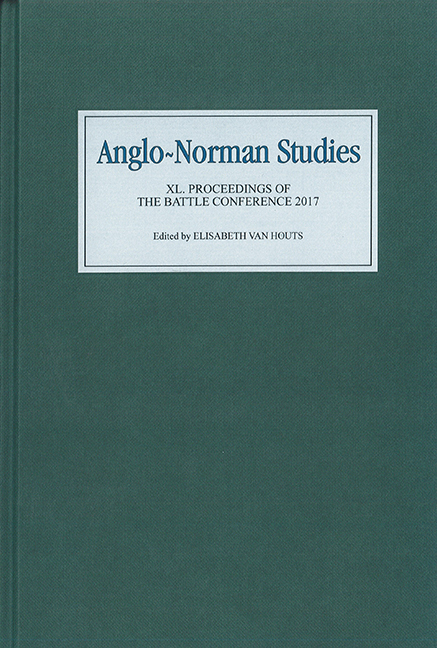Book contents
- Frontmatter
- Contents
- Illustrations and tables
- Editor's preface
- Abbreviations
- The R. Allen Brown Memorial Lecture, 2017
- The R. Allen Brown Memorial Lecture, 2016
- Audacity and Ambition in Early Norman England and the Big Stuff of the Conquest (The R. Allen Brown Memorial Lecture, 2016)
- Ressources et croissance dans le monde anglo-normand: sources et hypothèses
- The Marjorie Chibnall Memorial Essay, 2017
- Note: A Micro-Economy of Salvation: Further Thoughts on the ‘Annuary’ of Robert of Torigni
Ressources et croissance dans le monde anglo-normand: sources et hypothèses
from The R. Allen Brown Memorial Lecture, 2016
Published online by Cambridge University Press: 17 July 2018
- Frontmatter
- Contents
- Illustrations and tables
- Editor's preface
- Abbreviations
- The R. Allen Brown Memorial Lecture, 2017
- The R. Allen Brown Memorial Lecture, 2016
- Audacity and Ambition in Early Norman England and the Big Stuff of the Conquest (The R. Allen Brown Memorial Lecture, 2016)
- Ressources et croissance dans le monde anglo-normand: sources et hypothèses
- The Marjorie Chibnall Memorial Essay, 2017
- Note: A Micro-Economy of Salvation: Further Thoughts on the ‘Annuary’ of Robert of Torigni
Summary
Resource has always been a missing element in medieval economic history. According to the implicitly Malthusian model, which underlies most of the current literature, narrative about growth and crisis does not need a chapter on natural resources: where there is economic and demographic growth there must be resources; when crisis happens, resources must be insufficient. Such an interpretation takes its roots in the theses of Thomas Malthus (1766–1834) and Jean-Baptist Say (1767–1832), two major economists of early industrial times. Instead, in pre-industrial economies environment is not considered an opportunity for individual profit or entrepreneurial purpose: the main issue is legitimate needs and livelihood. Any thorough analysis of medieval economics should start with people's needs and the question of allowing them a means of subsistence, rather than with an assessment of potential benefits. The main challenge for the historian is to find useful evidence. For the Central Middle Ages, Fritz Curschman's book Hungersnöte in Mittelalter (1901) provides a very useful collection of cases, which, for the eleventh and twelfth centuries, casts light on the process of some severe famines, most of them in Flanders and Rhineland cities. The Anglo-Norman realm seems to have suffered less shortage of livelihood than the German regions. The abundance of harvests around the Channel shores is not easy to describe, still less to explain. For England, an enormous amount of literature, about manorial economy and open field husbandry, suggests that royal power and seigniorial institutions, which shaped the agrarian landscape, were the organizers of the allocation of wealth and the arbiters of need. Despite its pervasive influence on English political evolution, Normandy was a very different case. Medieval historiography and charters indicate that local markets were the real centres of the economic and social system. The many settlements of tithes conflicts in the late twelfth century and many more grain annuity contracts for the thirteenth century provide evidence of a complex system, whose many components all mattered: the nature of the crops (wheat, rye, oats and barley), the social identity of the consumers, the market and credit organization, pricing and assessment of values. This paper argues that any resource system could be very different according to place, but that it was always the core of any social organization.
- Type
- Chapter
- Information
- Anglo-Norman Studies XLProceedings of the battle conference 2017, pp. 53 - 62Publisher: Boydell & BrewerPrint publication year: 2018

